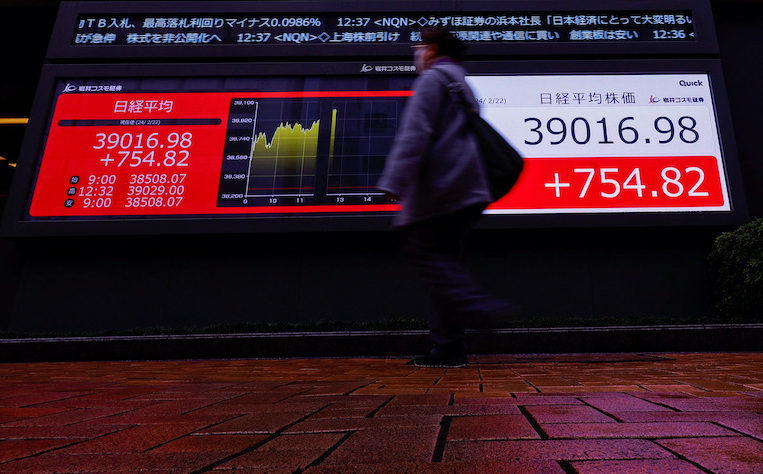Japanese stocks shot up to an all-time record high on Thursday, passing the mark last seen in 1989 when the country had an infamous bubble economy.
The Nikkei share index soared by about 2% to 39,000 points, as cheap valuations and corporate reforms lure foreign money looking for alternatives to China’s battered markets.
The 34 years it has taken to regain its footing is a record also for a major market, as the Nikkei has taken is a decade longer than Wall Street took to recoup losses from the 1929 crash and Great Depression.
ALSO SEE: Generative AI Seen Having Big Impacts on Environment – Nature
“It is hard to overstate the psychological impact to Japanese people of the Nikkei returning, since a generation has never seen that level,” Richard Kaye, a Japan-based portfolio manager at Comgest, said.
“The magnetism of the market could draw in unforeseen amounts of domestic liquidity,” he said.
Best performing major Asian bourse
The index is up almost 17% this year after surging 28% in 2023, when it was the best performing Asian major bourse. The tech-heavy Nasdaq, by comparison, soared 43% last year and is up 6% so far in 2024.
The Nikkei’s rally has defied a recession in Japan, wars in Europe and the Middle East, a global inflation shock and rising rates worldwide. Trade exposure has helped insulate it from deteriorating domestic demand while a weak currency has boosted exporters’ earnings.
The milestone also finally draws a line under decades of lacklustre performance that had kept global investors away.
Corporate governance changes in Japan are driving buybacks and unwinding cross-holdings, and foreigners are now spurring the rally with the likes of large investment from Warren Buffett in 2020 putting the spotlight on attractive valuations.
Foreign investors poured in 6.3 trillion yen ($42 billion) in the equity market last year. They spent a net 1.16 trillion yen in Japanese equities in January.
A robust earnings season and a falling yen, which is back near 150 per dollar level, as well as expectations that the Bank of Japan will stick with ultra-easy monetary policy for a while yet have supercharged the market at the start of 2024.
Bank of America’s Asia fund manager survey for February showed “optimism on Japan remains unscathed.”
Nearly one out of three participants expected double-digit returns from Japan’s stock market in the next 12 months.
“It is, by far, the favourite market in the region,” BofA analysts said, with fund managers tilting toward semiconductor and bank stocks.
A Reuters poll published today (February 22) showed analysts had raised year-end forecasts from 35,000 in November to now expect the Nikkei at 39,000 at the end of 2024.
Strong corporate reform push
The Nikkei’s lofty heights recall the boom years of the 1980s and memories of the collapse in the market and other assets that ushered in deflation and Japan’s “lost decade,” scarring a generation of investors.
Fast-forward three decades later, there is far less froth now and no portents of an imminent crisis with inflation running at just above 2% and corporate earnings booming even though the economy slipped into recession at the end of last year.
Uniqlo-owner Fast Retailing Co, chip tester Advantest Corp and chip tool maker Tokyo Electron are some of the firms behind the rally, compared to banking and real estate stocks three decades ago.
“It was extremely expensive in ’89/90. It is still reasonable this time,” said Junichi Inoue, head of Japanese equities at Janus Henderson
Japanese stocks’ forward price-to-earnings ratio, a common metric of valuation, went north of 50 in the bubble era, and is currently at 20.5 for the Nikkei, compared with 25 for Nasdaq and 20.4 for S&P 500 index, according to Refinitiv data.
Japan’s market has also been aided by a strong corporate reform push from the bourse itself and by fortuitous timing of its performance – it has been gaining while China has been tanking.
As the Nikkei has had a blistering run, Hong Kong’s Hang Seng Index is down 7% in 2024, after dropping 14% last year, and China’s blue-chip CSI300 index is near five year lows, driving money away.
Allocators say at least some of that is finding its way to Japan, where global funds have been below market weight for years while US and Chinese stocks had done so well.
To be sure, a weak yen has eaten away at returns in dollar terms and investors are nervous about sudden moves in the currency in either direction as Japan tries to plot a path out of its deflation slump and negative interest rates.
But steps last year by the Tokyo Stock Exchange to push companies with underperforming stocks improve use of capital has investor fundamentals improving, with record share buybacks as well as unwinding of unproductive cross-shareholdings.
Nearly half of the companies on the TSE’s prime section have responded to a call to disclose plans to improve capital efficiency, the bourse said last month, as it released for the first time a list of those who had complied.
Investors say a corporate cash pile – which stood at 555 trillion yen in 2022 – could pay for plenty more buybacks, while households’ hoard of 2.1 quadrillion yen in cash could also drive price gains were momentum to pull it into the market.
- Reuters with additional editing by Jim Pollard
ALSO SEE:
Japan Slips Into Recession, But BOJ Still Seen Ending Stimulus
Top Execs at Toyota’s Daihatsu Bow Out Over Safety-Test Scandal
Scandal-Hit Toyota Still World’s Top-Selling Automaker
BoJ Holds Firm on Easing But Hints at End to Negative Rates
Warren Buffett Says He Prefers Investing in Japan to Taiwan
























